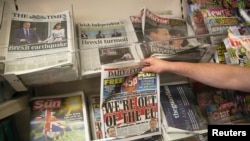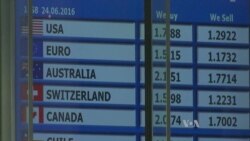For some Britons, waking up Saturday felt like a hangover, facing the reality of the financial and political earthquake that followed the decision by the country's voters to leave the European Union.
Public opinion polls showed the "Remain" camp — those who wanted to keep Britain in the EU — was favored heading into Thursday's referendum. So the victory by those who wanted to leave the EU surprised most Britons — even those who favored the British exit, or Brexit, from the European alliance.
The "Leave" campaign's margin of victory was narrow but decisive, confirmed before dawn Friday.
Ever since, social media have been buzzing with postings reflecting both anger and concern, as expected, from those who voted to remain. Twitter hashtags like #whathavewedone abound. One post featured a cartoon showing the British isles alone on a globe, with the captions "Free at last" and "Who are we going to blame for our problems now?"
Some media, using the newly coined phrase "Regrexit," quoted voters who had cast Leave ballots as saying the immediate impact of what they had achieved made them regret their actions.
Anger and other emotions stirred by immigration, sovereignty and economic issues animated many of those who voted to leave. And since pre-referendum opinion surveys indicated they were likely to lose the referendum, even some fervent supporters of Brexit did not believe they would win.
"Personally, I didn’t think we would vote 'out,' even though I voted 'out' myself," London resident Kiran Sagoo told VOA.
Quick reaction
The sobering effects of the decision came down quickly. Within the first 24 hours, markets plummeted, the British pound dropped to its lowest level in three decades, the country's credit rating was downgraded to negative, and new threats of the disintegration of Britain itself emerged.
In Scotland, First Minister Nicola Sturgeon held a Cabinet meeting to discuss her government’s position. Sturgeon said it was "unacceptable" for Scotland to be forced out of the EU when a solid majority of Scottish voters chose to remain. She predicted a renewed attempt to win a referendum declaring Scotland independent of the rest of the United Kingdom.
After her Cabinet meeting Saturday, Sturgeon told reporters her team would meet with EU officials to discuss their options "to protect Scotland’s place in the EU."
Irish border issues
Brexit also is stoking separatist sentiment in Northern Ireland, the only part of Britain that has a land border with an EU member — Ireland.
Sinn Fein leader Martin McGuinness renewed his calls for a referendum that would allow Northern Ireland to separate from Britain and reunify with the Republic of Ireland. "If there is a vote in Britain to leave the EU, there is a democratic imperative to provide [the people of Northern Ireland] with the right to vote in a border poll to end partition and retain a role in the EU," McGuinness said.
The prospect of Britain's departure from the EU, which could take years, already has triggered a rise in the number of people in Northern Ireland applying to obtain Republic of Ireland passports, according to postal officials in the British province. Google reported that the number of online searches for Irish passport applications doubled after the referendum outcome was confirmed.
Economists appeared to be the only ones who were not surprised or dazed by Brexit’s immediate aftermath.
Four days before the vote, HSBC chief economist Simon Wells sent a note to clients forecasting a 15 percent drop in the value of the pound and a plunge in the FTSE 100.
Economic upheaval to continue?
The index of the London Stock Exchange's 100 largest companies plunged steeply early Friday but recovered later to close down 3.15 percent.
“We were expecting some short-term economic pain. There might be a few people who journalists might have gotten hold of who say they didn’t realize what they were voting for. That’s the case in any election," said Keith Boyfield, a London economist.
"I always expected there to be a lot of noise and a lot of commotion following the actual results, and I suspect this will continue for several days," he added.
Some economists felt the British pound was overvalued when it rose to $1.49 against the U.S. currency just before the bulk of the votes came in, a time when polls were suggesting a Remain victory and investors were confident.
Leave supporters are pinning their hopes on the possibility that a lower pound may increase British exports, rebalance the currency and fuel an export-based economy.
How to leave the EU
Despite some reasons for confidence, uncertainty loomed large as questions arose in Britain of how the divorce would be carried out. The process of disengaging from the EU has neither precedent nor playbook.
Prime Minister David Cameron, who led the defeated Remain movement, has said he does not intend to invoke Article 50 of the European Treaty, the formal action triggering negotiations for a member state's departure. Cameron, who resigned Friday, effective October 1, said that would up to his successor.
European Union members on Saturday urged a departure as soon as possible.
The British government, not the EU, must initiate the process of disengagement; the treaty calls for up to two years of negotiations, and some analysts estimated the complicated process would take much longer.
British and EU officials will have to negotiate the terms of departure and untangle both sides' financial regulations and tariffs, and the rights of citizens of both entities to freedom of movement.
Some blame US
All of these complications were spelled out in advance to voters, in leaflets, social media, public announcements, billboards and news interviews. But the information by itself was not what influenced many voters who chose the exit option.
Some of those who cited sovereignty as their main reason for voting to leave said U.S. President Barack Obama helped them make the decision when he visited Britain in April. He warned Britons their country would “go to the back of the queue” on trade deals if it left the European Union, and some found that advice hard to take.
“We wanted our democracy back. We wanted to take control control of our country,” said London voter Trevor Bayley. “I think your president unwittingly had a part to play in that. He tried to shore up the establishment vote, and people didn’t like to be told what to do.”
For members of London's large community of EU expatriates — citizens of other European nations living in Britain — the concern was palpable Saturday.
"I don't know what's going to happen. I could be illegal in a few months," said Ana, a Portuguese nurse who spoke to VOA in London's Marylebone borough.
"I'm not going anywhere now," said Camille, a resident of Fulham, a West London neighborhood that is home to a sizable French expatriate community. "My husband and I work here. Our children are here. We have been here for seven years, but we'll see. We will leave if it becomes unlivable."








